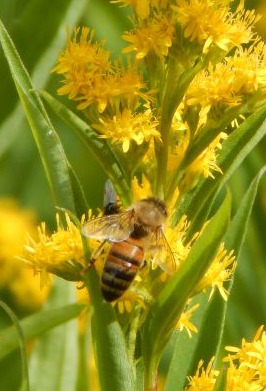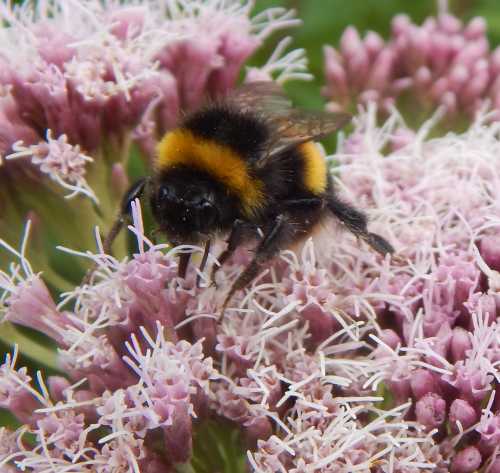Why Do Beekeepers Feed Sugar To Bees?
For various reasons, beekeepers may feed sugar to bees. I think the reasons for this are worth
exploring and explaining on this website.
Every now and then, I hear people criticizing this practice, and the reason for this criticism, though generally well-intentioned due to concern for the welfare of honey bees, is usually down to an incomplete understanding.
It is true that honey is not a wasteful by-product made by bees for the sake of it, and just to suit humans.
Honey is actually the winter food stores made by honey bees. Honey is therefore intended to supply the colony with its nutritional requirements through the winter.
In order to create these food stores, it's essential they have access to plenty of suitable flowers from which they can gather nectar. They also need appropriate weather conditions, so that they are able to get outside and forage for food which they can bring back to the hive or nest. See my page: Why Do Bees Make Honey.
However, it is not true that all beekeepers only feed sugar to bees for selfish reasons, and that all beekeepers give sugar to bees because they have just removed all of the honey. So let's get to the question:
Why do beekeepers feed sugar to honey bees?
Let’s consider the reasons why a responsible beekeeper, who cares about their bees, would feed them sugar.
1. Cold, wet summers
Hopefully,
winter feeding will not be necessary if a beekeeper has left sufficient honey
behind in the hive for the bees to consume.
However, in times of very cold, wet summers, bees will have less
opportunity to forage, and flowers may have a poor season.
Ask any horticulturalist, and they will confirm that weather can have a severe impact on outdoor flower crops. A couple of warm, sunny weeks may not be enough for a colony of bees to gather sufficient nectar to build up honey stores.
It only takes a miserable winter, following a poor summer, and the bees could be at risk. For this reason, beekeepers step in and feed the bees with sugar.
2. Compensation for honey harvest
If beekeepers remove a crop of honey from the
hive for their own consumption (that is, a portion of the honey), the beekeeper
will compensate, by providing sugar.
3. Early boost
Beekeepers may feed a colony early in the year
to ‘get the bees going’ and arguably when availability of food from floral sources is limited. Feeding
encourages the queen to lay brood in order that there are more workers to
gather nectar when the flowers are in full bloom.
In short, there are perfectly valid reasons for feeding bees to help them through a tricky patch.
Author and beekeeping guru, Paul Peacock writes in his book, Keeping Bees:
“A careful beekeeper will not take more than the colony can easily afford to miss”.
Do honey bees like sugar water (also called 'sugar syrup')?

It seems honey bees do like sugar syrup, and indeed, they are attracted to other sweet secretions of various types, such as honeydew - see my page What Do Bees Eat?
However, honey contains nectar, and also traces of pollen.
Well-known beekeeper, Phil Chandler, author of The Barefoot Beekeeper says:
“We consider it as self evident that if the bees store honey for their own use, then honey is what they want and need.
Sugar syrup is, at best, a poor substitute. Therefore, we strive to leave enough honey in the hive for the bees’ winter feed”.
"But some commercial beekeepers take most of the honey, don't they?"
I think part of the problem is that honey is seen by many people as a cheap commodity.
In my view, it would be better if all honey was viewed as a premium (or even luxury) ingredient. Perhaps we have become far too accustomed to the supermarket ‘see it piled high, get it cheap’ mentality, or in other words, appreciating the price of everything and the value of nothing.
So, if we want to reverse this, let’s try and buy honey in a responsible manner, and be prepared to support good beekeeping practice where we can.
In some countries there have been scandals regarding the entry of contaminated honey onto the market, and also honey mixed with corn syrup. This is wrong and misleading, because it helps set an expectation of a very low price, even when it's not real honey.
If you are concerned about the welfare of bees, and are worried about honey bees being exploited, I recommend you:
- Seek out honey from a beekeeper you trust, and
importantly, be prepared to pay a fair price.
Or
- Become a beekeeper yourself.
Or
- Don’t buy it if you are unable to find a supplier of real honey. Instead, use a substitute for honey on
your pancakes, such as maple syrup.
Wacky Fact
Did you know?
If the honey bee queen is removed
from a
hive, within 15 minutes,
the rest of the colony
will know about it! Read about
Ever wondered......
Do bumble bees make honey?

If you found this page helpful or interesting, I'd really be grateful if you would share it with others - if not this page, perhaps another, such as Gardening For Bees.
Thank you so much :) .